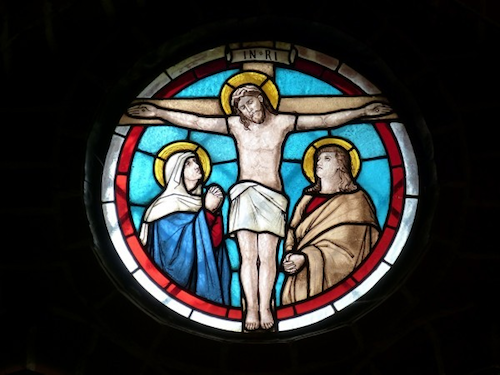We run our website the way we wished the whole internet worked: we provide high quality original content with no ads. We are funded solely by your direct support. Please consider supporting this project.

God’s Love is Cruciform
Paul instructs us in what it means to follow Jesus, when he stated, “Follow God’s example, therefore, as dearly loved children and walk in the way of love, just as Christ loved us and gave himself up for us as a fragrant offering and sacrifice to God (Eph 5:1-2). Here Paul defines what it means to imitate God and to “live a life of love” not merely by pointing us to Jesus but by specifying that we are to follow the example of Christ who “loved us and gave himself up for us…” (Eph. 5:1-2, NIV, emphasis added). Paul virtually equates “following (mimētēs) God” (which could be translated as “imitating God”) with living “a life of love, just as Christ loved us and gave himself up for us.”
Several verses later Paul applies this cruciform understanding of love to husbands when he tells them to “love your wives, just as Christ loved the church and gave himself up for her” (Eph. 5:25). While everything Jesus did reflected God’s love, it’s clear that Paul regarded the cross to be the ultimate expression of this love.
Reflecting this same perspective, Paul elsewhere declares that God’s love for us is demonstrated not merely in the fact that Christ became a human and lived a life of self-sacrificial service to others, as remarkable as these things are. It is rather most powerfully demonstrated in the fact that “[w]hile we were yet sinners, Christ died for us” (Rom. 5:8). So too, Paul fleshes out what it looks like for the Philippians to love one another by instructing them to have “the same attitude of mind Christ Jesus had” (Phil. 2:5). This attitude was displayed when Jesus set aside his divine prerogatives, “made himself nothing,” and “humbled himself by becoming obedient to death – even death on a cross” (Phil. 2:6-9).
So too, when Paul explains why he and his colleagues appear to some to be “out of [their] mind” (2 Cor. 5:13) because of the sacrifices they make as “ambassadors of Christ” (2 Cor. 5:20), he declares, “Christ’s love compels us” (2 Cor. 5:14). He then elaborates on this love by appealing to the cross, explaining that Christ “died for all” so that “those who live should no longer live for themselves but for him who died for them and was raised again” (2 Cor. 5:15).
The cross is clearly the definitive expression of Christ’s love and thus the criteria by which his followers must measure their love. It’s no surprise, therefore, when Paul later challenges the Corinthians to prove their love by sacrificially giving to brothers and sisters in need (2 Cor. 8: 7-8, 24). “Cruciformity” lies at the heart of Paul’s understanding of God, salvation and the kingdom life. More could be said (as I have two chapters on this in Crucifixion of the Warrior God), but I believe this suffices to demonstrate that the love that God eternally is, as revealed in Jesus Christ, and the love that is to characterize all who are “children of the most High,” is cruciform in nature.
Photo via VisualHunt.com
Category: General
Tags: Crucifixion of the Warrior God, Cruciform Theology, God is Love, God's Love
Topics: Attributes and Character
Related Reading

Podcast: What Do We Do When the Bible Sends Mixed Messages?
Greg considers how to interpret mixed commands in the Bible—where one verse advises differently than another. http://traffic.libsyn.com/askgregboyd/Episode_0364.mp3

One Hope
When Jesus was crucified by his enemies instead of conquering his enemies, the hope of Jesus’ disciples came crashing down in utter despair. They had hoped that Jesus would establish the kingdom of God in the same way that other kingdoms were established. However, the resurrection reveals that the kingdom of God is not like…

Podcast: Has Greg ‘Gone Liberal’ in His Cruciform Hermeneutic?
Greg consoles a disappointed fan and discusses Cruciform Hermeneutics. http://traffic.libsyn.com/askgregboyd/Episode_0365.mp3

God’s Kind of Warfare
Over and over, and in a variety of different ways, we are told that, while “[s]ome trust in chariots and some in horses,” Israelites were to “trust in the name of the LORD our God” (Ps 20:7), for “[n]o king is saved by the size of his army” and “no warrior escapes by his great…

Sermon 7/22/12: The Shadow of the Cross
In his sermon this past Sunday, Greg continued his fleshing out thoughts from the previous week on how he reconciles the violent, disturbing portraits of God in the Old Testament with the revelation of God in Jesus Christ on the Cross. He answers a question raised by several in response to last week’s sermon: Did God actually engage…

Podcast: Overflow Episode 1 — Dust, Flashlights, and Heathens
Dan and Brianna tackle some tough questions: —Is it okay for Christians to be cremated? —How can we preach from the OT with authority? —What should a Christian academic know in a secular school? http://traffic.libsyn.com/askgregboyd/Episode_0320_overflow_1.mp3
